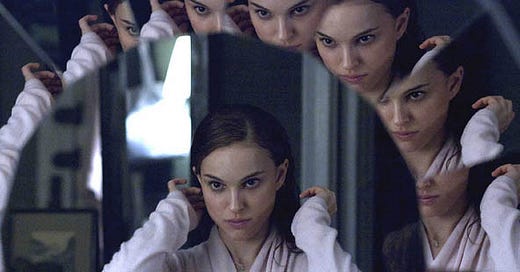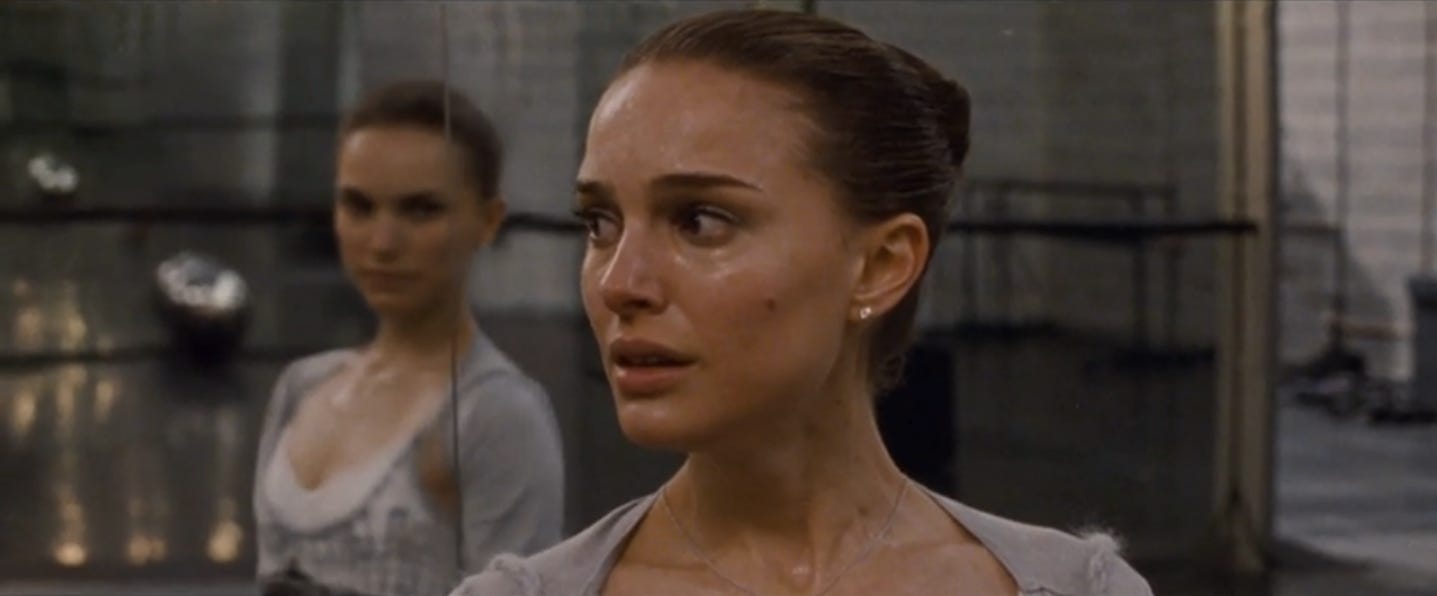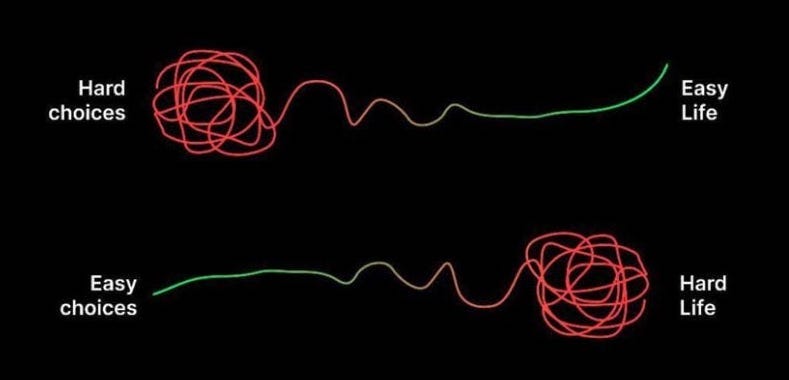“To go wrong in one's own way is better than to go right in someone else's.”—Dostoevsky
Today I woke up with a stillness in me, a certain sense of: I’m headed in the right direction (for context: I just quit my job to focus exclusively on writing). It’s funny because people keep giving me advice, asking questions, saying things to me like: you should really do x, y, or z. or, what is your plan if you fail? And I listen to them, and act pensive (and maybe I am pensive), but the truth is that none of it really infiltrates my psyche. I think this is because for the first time in my life, I’m not competing with anyone but myself.
The contingency plans everyone is trying to tease out of me are certainly useful. And I do have them at the back of my mind. But they aren’t what I think about every day, nor are they what I’m most interested in talking about. I think backup plans and “if, then”s are most useful when you aren’t fully in it. At least, that is when they’ve been most useful to me. It’s when I’m not totally committed to something that I want a backup. It’s not when I wake up thrilled at the thought of getting after it. It’s not when my focus, attention and future feel totally aligned. In those cases, all I’m thinking about is what outrageous success looks like and how I can inch myself towards it each day.
If you ask any successful person about whether you should do something high-risk-high-reward, they will likely say: yes, but have a backup plan. And who wouldn’t? If someone asked me, I probably wouldn’t advise them to flail into the ether, taking massive risk with no real contingency plan, but the truth is: this is exactly what many of them do. Most people who knock it out of the park are thinking about one thing only: hitting the ball squarely, as hard as possible, and watching it fly. To them, any time spent thinking about something else is time wasted. And that is how they succeed.
“I am the greatest. I said that even before I knew I was.” — Muhammad Ali
There’s this excerpt that always sat funny with me from one of my favourite books: Jerry Weintraub’s autobiography: When I Stop Talking You’ll Know I’m Dead. Jerry started as a poor kid from the Bronx and became one of Hollywood’s titans (producer of movies like the Karate Kid and Ocean’s Eleven, and manager of Frank Sinatra and Elvis Presley). In the book (on the first page actually), he dispenses a life philosophy that he allegedly believes, but could never follow himself:
I have a philosophy of life, but I don't live by it and never could practice it. Now, at seventy-two, I realize every minute doing one thing is a minute not doing something else, every choice is another choice not made, another path grown over and lost. If asked my philosophy, it would be simply this: Savor life, don't press too hard, don't worry too much. Or as the old-timers say, "Enjoy." But, as I said, I never could live by this philosophy and was, in fact, out working, hustling, trading, scheming, and making a buck as soon as I was old enough to leave my parents' house.
I mention this quote to illustrate two things: (1) Jerry is a legend and you should read his book (seriously), and (2) don’t trust the advice of successful people, because they probably wouldn’t have taken it themselves. They would have gotten after what they wanted as soon as they could, just like Jerry did.
I was discussing this with a founder friend who said something along the lines of “I’ve generally found that successful people’s advice is what they would have done to avoid the pain their success required.” Which: true. It’s hard for successful people to give you the “secret sauce”, but they can tell you how to not hate yourself by the end of it, so they typically do that, instead. But that advice should not be confused with the advice that will help you win. Because, as I’m about to get into in this piece, that can ultimately only come from one person: yourself.
competing with myself
I’ve noticed something unusual recently: the treadmill I run on at the gym has these black screens attached to them where people can watch TV. Since I have no desire to watch the weather channel or the news, I leave it turned off. So as I’m running, I see this blurry, imperfect reflection of myself bouncing up and down on the screen at the pace of my jog. I see myself sweat, breathe hard, go faster. And there’s something about looking directly at my reflection that makes me think think: you can try harder than the girl you are looking at. And so I do. I go faster. Sweat more. Breathe heavier. I push myself to compete with my reflection.
This process is really drilling in the idea that: above all else, I’m competing with myself. I struggled to internalize this in the past is because it never really felt like I was competing with myself. It felt like I was competing with other people at my level, to get to the next level. It was always me vs. others: students in my classes, gymnasts at my level, others working similar jobs to me. I liked the notion of competing with myself, but as much as I tried to look in the mirror and say: BEAT YOURSELF TODAY! It still felt like a ruse, something fake. My brain was like: girl, no one is buying this. You’re not competing with yourself, you’re trying to beat other people doing similar things. You’re climbing a pre-determined hierarchy where you know who to beat and how to win.
I was trying to jam the idea into my brain, but it wouldn’t fit. Lately though, it has fit seamlessly, because when I look around to find people to keep up with, there’s no one to compare myself to. I’m in my own lane now. I wake up every day and my only goal is to beat the me of yesterday. Because if I can do that, I’m winning. I’m accelerating towards the person I want to become.
A long time ago, before my quote collection hit puberty, there was a very tumblr-2012-era quote I had saved, thinking: I want this to be me. I’m almost there, but not quite. That quote was:
“She silently stepped out of the race that she never wanted to be in, found her own lane and proceeded to win.”
Despite its target market being 14 year old girls, it’s only now that I finally feel like I get it. When you step out of a race you don’t want to be in, get in your lane, you finally can proceed to win. Because the path forward is yours, and you can craft what it looks like. Winning is beating yourself every day, working towards your definition of success, at the pace you choose to define.
There is a certain thrill to this, a sense of joy/ease where I can relax into this notion of competing with myself, and re-focus. For so long I found myself in competitions where I wasn’t exactly sure where I was aiming or why. I was just seeking the most challenging competitions, and fighting hard once I got into them. But now, with an independently derived goal, I feel the difference—the desire to win against myself is pulsing like a heart beating fast, trying to get its body to the finish line.
Now, when I wake up, I ask myself: Can I do better than I did yesterday? Produce better work? Work harder in the gym? Write more words? Better words? Be more focused? Can I beat my goal for what I want to publish this week?
Could I have asked myself the same questions if I wasn’t on a solo-focused path? Yes. But for some reason (and maybe this is just me), it didn’t click. It was always me versus someone. I was always looking around, taking note of my competition. Keeping up with them. Trying to do slightly better than them. But now, it’s just me versus me. And I make for some pretty fucking good competition.
Everyone knows that to beat your competition, you need to understand their weaknesses (think: Beth in the Queen’s Gambit studying the Russian World Champion’s past chess games to understand his play). So, I like competing with myself, because (a) I must understand all my faults and work relentlessly to overcome them to win, and (b) I don’t have to constantly ask myself: Is this person good enough to compete against? Too good to compete against? I always have fair competition. It’s me today vs. me yesterday, every day. And beating myself drives me.
This also feels topical with my recent obsessive watching, reading about, and re-watching of the film, Black Swan (2010), directed by Darren Aronofsky, starring Natalie Portman who won the Oscar for her performance. The idea for the film stemmed from Dostoevsky’s book The Double, where a second version of the protagonist—a better, smarter, sexier version—is replacing them in their life, in front of their eyes. Aronofsky ended up adapting this idea to the Swan Lake ballet, which is the basis of Black Swan, where Nina (the protagonist) battles against herself to give the best possible performance as the prima ballerina in Swan Lake.
The movie made me think about how most of our struggles are just us against our own mind. The narratives about who we need to beat or how we need to win are simply a subconscious projection of our inner competition onto others. This projection literally happens in the movie when Nina starts seeing her own face in Mila Kunis’ character, Lily.
By the end, she becomes paranoid, believing that the world is against her, and that someone is ‘after her’. The irony is that it is her all along: her in her own head, projected onto other characters and (spoiler ahead) this manifests itself in the final scene—where she thinks she is killing Lily, then she thinks she is killing her Double, but actually ends up killing herself. The whole time—the battle, betrayal, competition she felt from her environment was actually her vs. her.
By the end of the movie, I found myself thinking: what would have happened if she stopped worrying about the other characters beating her, betraying her, or stealing her “spot”, and just competed with herself? Her teacher repeatedly tells her: Do what you can do, Nina, and you will be fine. He is saying: just compete with yourself. But she can’t. Nina perceives everything as a slight against her—as an active threat. You can see the distress in this exchange between her and her teacher, Thomas:
NINA: Thomas! She’s trying to replace me.
THOMAS: What’s going on?
NINA: Lily. You made her my alternate.
THOMAS: There’s always an alternate, you know that. Lily’s the best choice.
NINA: She wants my role.
THOMAS: Every dancer in the world wants your role.
NINA: No, she’s different. She’s after me. She’s trying to replace me.
THOMAS: Nina...
NINA: Please believe me.
He studies her for a moment, not sure what to make of this.
THOMAS: Listen, I know it’s been a struggle. But you had a breakthrough this morning. Tomorrow is yours. Give a great performance, and you won’t have to worry about Lily, or anyone else.
NINA: Thomas—
THOMAS: No more. Go home and rest.
She just can’t untangle this belief that everyone is against her. Her critical flaw is that she confuses the competition she’s having with herself for the competition she’s having with the rest of the world. It is the externalization of this inner competition that causes her demise. If she focused on beating herself—without worrying about Lily or anyone else—she could have succeeded. The movie isn’t a perfect example, as there was clearly a mental unravelling far more serious than anything I could examine in an essay like this, but it does give rise to an important question for us to consider:
How much of what we perceive as the world threatening us is just our competition with ourself, externalized?
It’s a reminder to focus on the most important (and possibly only) real competition: you vs. you. There’s only one person we’re spending the rest of our lives up against—when we wake up, go to sleep, when we’re frustrated, waiting in traffic, in line impatiently, resisting the gym, in a fight with a spouse, frustrated with a child—there’s only one person really getting in the way of us doing those things well: us. When we center our focus on being better than we were in the previous day—in the previous moment—we can win.
Can other people be obstacles? Sure. And in toxic situations, others might even prevent us from controlling our lives (we should remove ourselves from those situations), but in most cases, the only person responsible for our daily activities, decisions, and output is us. That is who we should focus on when we want our lives to look different. Everyone else is just a canvas for projection. The projection of our internal battle: of being better, or staying the same. Of doing the hard thing, or the easy thing.
Once we see that what often appears to be the world threatening and competing with us is really just an external projection of ‘us vs. us’, we can focus on the real battle at hand. We can focus on our biggest competition—the person that knows all of our tricks, weaknesses, pitfalls, insecurities, and inhibitions. The person that is best suited to out-smart us, that is the hardest (and most rewarding) to beat: ourselves.
“When you compete with a person, you only have to be as good or better than the person to win. If you compete with yourself, there is no limitation to how good you can be.”—Chin-Ning Chu
PS—Say hi on Twitter if this resonated! My DM’s are open (@isabelunraveled). I also talk more about Black Swan in this thread.







